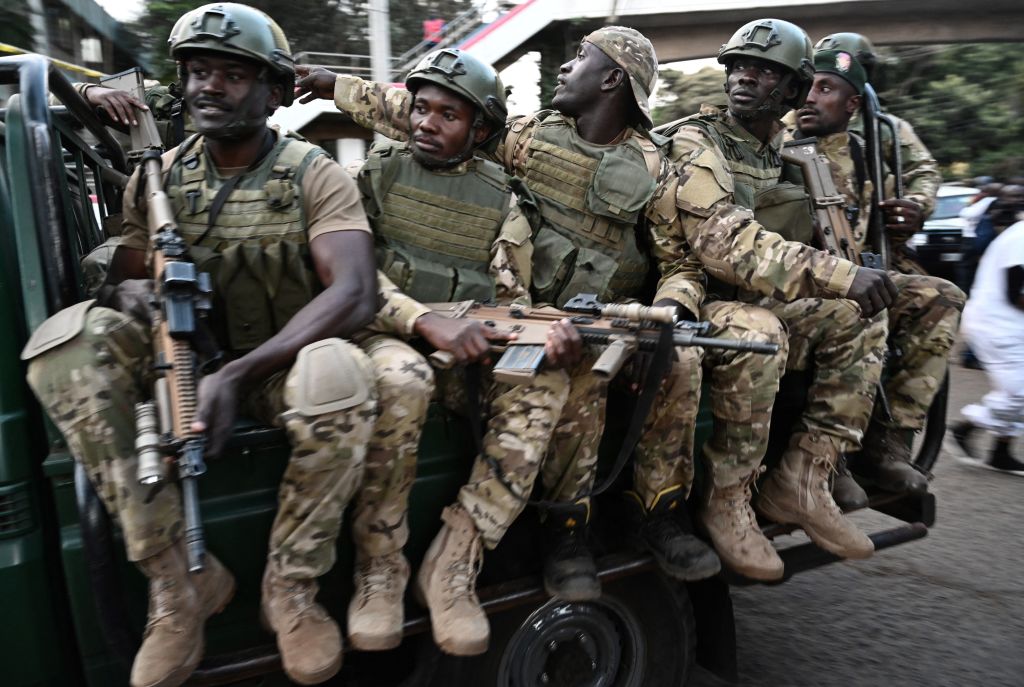ADF STAFF
In 2022, Somali President Hassan Sheikh Mohamud ordered a major offensive against the al-Shabaab terror group. With the help of African Union forces, those military operations have yielded results.
According to a March 2023 report from Somalia’s Defense Ministry, military operations have liberated about 70 towns and villages with more than 3,000 militants killed and 3,700 injured.
But analysts are warning that the loss of terrain in Somalia may push al-Shabaab to launch new attacks in neighboring Kenya.
Al-Shabaab attacks in Kenya have risen steadily over the past five years, including a 26% rise in 2022, according to a report released by the Nairobi-based Centre for Human Rights and Policy Studies.
“Al-Shabaab continues to pose a threat,” researcher Rahma Ramadhan said in a statement. “The frequency of terror-related attacks has increased over the year, largely targeting security officials primarily on transit or on patrol by the use of various explosive devices.”
There were 77 attacks in 2022 that resulted in 116 dead, an increase over the 51 attacks and 100 casualties in 2021. Half of the attacks targeted security officials.
The 2022 attacks were concentrated in four counties near Kenya’s border with Somalia. With 37 terror-related incidents, Mandera was the most affected county.
Lamu county saw 21 attacks, followed by 19 in Garissa county and nine in Wajir county.
Kenya first sent hundreds of troops, along with tanks and helicopters, across the border in the 2011 Somali-approved Operation Linda Nchi, which translates from Swahili to “Protect the Country.” The mission was to counter al-Shabaab’s growing insurgency that had been responsible for a number of attacks and abductions along the Kenyan coast.
Today, Kenya is among the troop-contributing countries for the AU Transition Mission in Somalia (ATMIS) alongside Burundi, Djibouti, Ethiopia and Uganda.
Al-Shabaab, which is linked to al-Qaida, more recently has engaged Kenya with a new approach — guerrilla warfare.
Experts such as Mohammed Ibrahim Shire say the terror group’s intention is “provoking a violent overreaction” from Kenya against the ethnic Somalis who live near the border.
A lecturer in security risk management at the University of Portsmouth, Shire reports that more than 70% of al-Shabaab’s transborder guerrilla attacks were conducted in Kenya’s northeast region, which includes the four counties that border Somalia.
“A provocation strategy attempts to elicit a disproportionate violent state response against a target audience to mobilize the aggrieved civilian populace,” Shire wrote in a study published in the journal African Security.
“Its goal is to expose the regime’s ‘repressive face’ to the civilian population, among whom the militants seek to gain sympathy and generate widespread resistance.”
Shire, who interviewed 31 al-Shabaab defectors and 40 eyewitnesses to the guerilla operations in Kenya, said the terrorists also seek “a protracted conflict of attrition that harasses and seeks to wear down a much stronger conventional army.”
Kenya has boosted its border security, including a police anti-terrorism unit, the army and intelligence services.
Their presence, however, has given al-Shabaab more Kenyan targets.
In a February state of security address, Interior Cabinet Secretary Kithure Kindiki said Kenya has intensified its fight against al-Shabaab.
“We have disrupted many terror plots at source, neutralized and or arrested dozens of suspected terrorists, and destroyed a huge cache of weapons and explosives that could have badly harmed our people if they were not intercepted,” he said.
Kindiki said the offensive by Somali and AU forces has “tremendously weakened” al-Shabaab. But Kenyan security forces remain alert and have enhanced intelligence gathering to prepare for militants crossing the border.
“We have stepped up our border patrols and upped our surveillance on the proliferation of illicit arms and narcotic drugs,” he said.
“We must always strike first and fast to neutralize them and obliterate their nefarious networks.”

